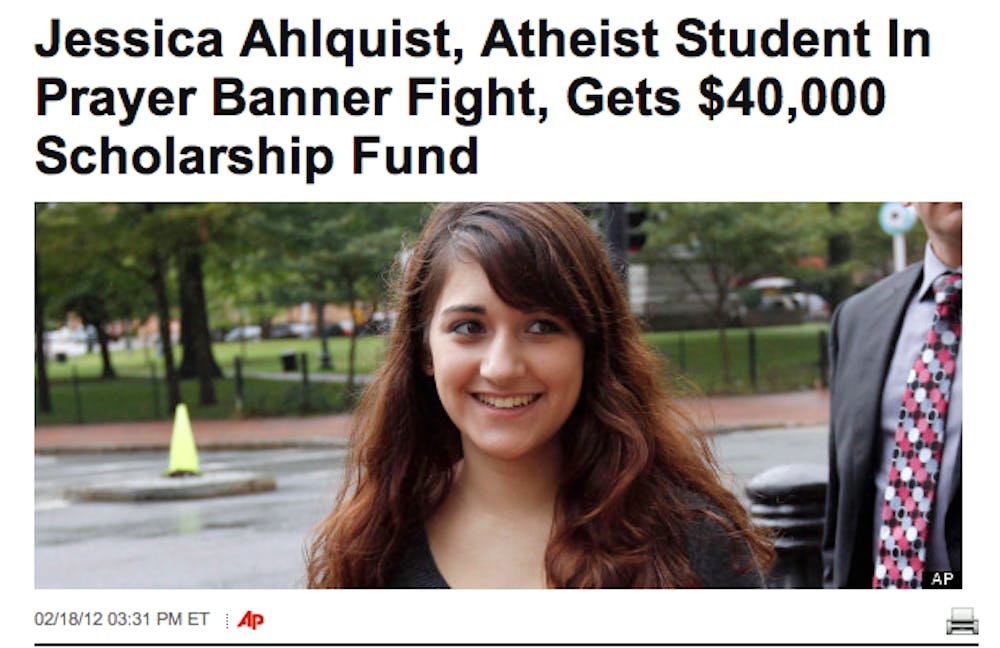“Our Heavenly Father,” read the beginning of a prayer banner that used to hang in Rhode Island’s Cranston High School West. “Grant us each day the desire to do our best.”
It’s just a little prayer, according to countless Rhode Islanders who protested its removal. How offensive could it possibly be? Clearly, anyone in stark opposition is just taking things much too far, trying to eradicate religion from society. How much harm could it really do to wish someone Merry Christmas without knowing his or her beliefs? How terrible could it be to say “God bless you?”
Throughout much of my 13-year career as a Catholic school student, I seldom took the time to consider the other side of the religion argument. After all, my parents and teachers seemed to have a point. I grew up in Rhode Island, the most Roman Catholic state in the country as well as, almost paradoxically, one of the most liberal. Good-intentioned well wishes and thanking God during high school graduation speeches couldn’t possibly hurt anyone’s feelings; the very definition of “Catholic” is actually “universal.”
But as I began to question my beliefs late in my senior year of high school, challenging the set of rules I had inherited but never fully understood, it became increasingly clear why students like Rhode Islander Jessica Ahlquist fight to keep religious references out of schools.
Ahlquist, a high school junior, has been under fire recently since a federal judge ordered Cranston West to remove the prayer banner that had been hanging in its auditorium since 1963. Seeing the prayer every day was a clear signal to Ahlquist that she did not belong, she said. Many of the state’s “Christians” have responded with such hatred she needed a police escort to class. A state representative inappropriately and unnecessarily called her an “evil little thing” on public radio, fueling bullies’ fire.
Ahlquist’s story has made national news, and many people have written letters to newspaper editors that she should merely look away so that the prayer does not bother her.
In other words, it would be best if she stifled her beliefs.
The First Amendment clearly states Americans have the right to freedom of both speech and religion, and it is a shame we often find these two to be mutually exclusive.
Conversations about religious beliefs should not be banned from schools entirely, as that would prevent a much-needed lesson on tolerance and diversity of opinions. But an academic institution, or public forum of any kind, should never hold the beliefs of one religion above any other. Nor should these beliefs be manifested in a form intended to uniformly represent the beliefs of an entire body of people.
Like Ahlquist, in recent years, others’ informal assertions of their faith and unspoken assumptions of my own have begun to make me uncomfortable. I have felt judged for not adhering to the same set of religious beliefs as friends who are Christian. At home, I have often felt compelled to hide my lack of faith.
Casual assumptions I am Christian serve as constant reminders I am somehow wrong for not feeling the same attachment to God others say they felt so strongly. Even now, although I recognize this is a private institution, I find myself feeling slightly out of place when I hear President Leo Lambert thank God on behalf of Elon University at major events like Convocation.
This kind of exclusion, which Ahlquist has felt and bravely combatted, is easily solved by allowing religion into public schools only academically, not evangelically. We should not limit students’ First Amendment rights to discuss their faith with their friends when appropriate, but there should be no institutionalized favoritism of one religion over another.
School should be a place where we learn to respect each other’s opinions, not ignore them in favor of pretending everyone thinks the same way. I fail to see the merit in allowing our citizens to cop out of intellectual discussions because they occur outside their cozy comfort zones. Asking a student to merely look away from a blatant violation of First Amendment rights because a loud minority is afraid its beliefs will be threatened is not an acceptable solution.
Part of the reason many Christians refuse to accept that Jews and Muslims share the same deity and religious roots is that this stereotype of “the other” is perpetuated by an unwillingness to discuss and understand others’ belief systems without the fear of judgment or evangelizing.
Secularizing schools is not the attack many Christians perceive it to be. What society needs to realize is that eliminating a bias is not a move to eradicate a set of beliefs. Rather, it is a move to protect everyone else’s, and ensure we do not stifle the individuality and spirituality of those in the quieter majority.


